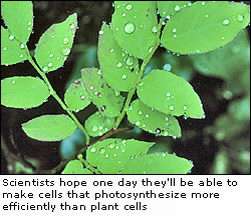Testing how well chemical cells work could provide answer to recognising life

A test to see how well manmade chemical 'cells' can pass themselves off as the real thing could help scientists solve the problem of defining when something is alive, say researchers writing in this month’s issue of Nature Biotechnology.
Work to build chemical cells, known as 'chells', which are made using chemical components and act just like cells in plants or animals, is in the very early stages of development. Scientists hope one day to develop a man-made chemical system which carries information, replicates and sustains itself like a biological cell, and which is – to all intents and purposes – alive. To do this they will need a method to test how life-like their cell is.
The team, including Dr Joachim H. G. Steinke from Imperial College London's Department of Chemistry, suggests that the best way to do this is to test if the manmade cell can be detected as a 'fake' when it is set up to interact with natural biological cells.
The researchers show how this kind of test could work in the same way as the so-called 'Turing test' which is used in artificial intelligence to ascertain if a computer is capable of successfully imitating thought. The Turing test is also known as an 'imitation game', and involves a person communicating with both another person and a computer using an instant messaging service: if the first person cannot distinguish between the human and the computer from their responses, the computer is said to have successfully imitated thought.
The researchers envision applying this idea to testing the quality of manmade chemical cells by setting up a test where a manmade chemical cell and a regular biological cell have to interact with a second biological cell. If the chemical cell has been successfully built, it should be able to 'fool' the second biological cell into interacting with it in exactly the same way as it does with the normal cell.
Dr Steinke explains: "This kind of test will play a vital role in assessing how effectively scientists' attempts to build a workable chemical cell are progressing, but it could also help to advance our understanding of the meaning of life, or at least of what life is not. In effect, if we can build a cell which behaves so much like a regular cell that even another cell cannot tell it’s a fake, then you could argue that we would have created an artificial cell that is 'alive'."
The team hope that in the future chemical cells will be built that can do things their biological equivalents cannot, since these 'chells' will not be constrained by the limitations of biological systems, such as only working at certain temperatures.
"One of many possible future uses for this kind of chemistry would be to create a functioning 'chell' which converts sunlight into chemical energy much more efficiently than plant cells, which are only 1-2 per cent efficient," adds Dr Steinke.
Source: Imperial College London















